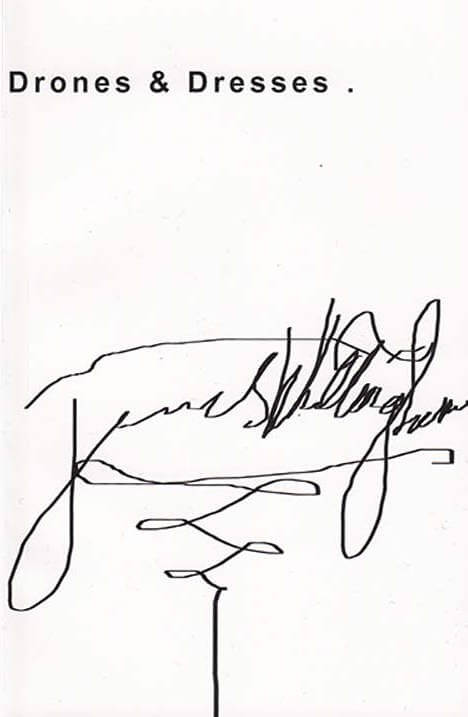
Drones and Dresses
Language: English

Language: English

F.R.DAVID is a typographical journal, dealing with the organisation of reading and writing in contemporary art practises. The 19th issue, “very good*” is edited with Paul Abbott. Like music, the issue’s “theme” is better off unaccounted for, and up in the air, like a flock of birds (creatures who feature heavily), circling around performance, listening bodies, given time, and loving relations.
The nineteenth issue of ‘F.R.DAVID’ is edited by Will Holder and Paula Abbott, and will serve as a reader for “We can still see the horizon (and it’s curved)”, a summer residency in Scotland led by the editors. It includes a surprising array of contributions from writer Jorge Luis Borges, journalist and writer Italo Calvino, composer Hugo Cole, literary critic and theorist Barbara Herrnstein Smith, percussionist Milford Graves, philosopher Michel Serres, novelist and essayist Wilson Harris, poet Bernadette Mayer, composer and music theorist Harry Partch, pianist and poet Cecil Taylor, and several others.

Desiderata is a collection of Lizzy Mercier Descloux's poetry, photos, and diaristic fragments from her visit to New York City in the winter of 1977. Only eighteen at the time, Descloux fell into the orbits of the nascent No Wave scene festering in Lower Manhattan, where she befriended Richard Hell, Patti Smith, and ZE Records founder Michel Esteban. Desideratacharts the musician's early ambitions as a writer, revealing a potent poetic voice that careens from acid-tinged social observations to outright Dadaist semantic revelry, interspersed with collages and hand-written notes. Originally composed entirely in French, this is the first time these works have ever appeared in English and this edition includes the original French facsimile bound tête-bêche with the new English translation.
Martine-Elisabeth "Lizzy" Mercier Descloux (16 December 1956 – 20 April 2004) was a French musician, singer-songwriter, composer, actress, writer and painter. She collaborated with a wide range of musicians including Wally Badarou and Chet Baker.
Emma Ramadan was initiated into the mystery of Bastet at the age of thirteen and rose to the station of High Scioness. After leaving the temple she hopped freight across the Maghreb, where she began translating esoterica carved into the boxcar walls. She has independently discovered numerous uncatalogued cave systems and varietals of nightshade tea. Her name appears on the underside of stones and in various magazines whose pages seem to turn on their own.
Translated by Emma Ramadan.
Bilingual edition: FR/ENG

Jesse Darling, Heinrich Dietz and 2 more
Constructed in Pennsylvania in 1827, Gravity Road was a precursor to the modern roller coaster; a sloping stretch of railroad used to cart coal out of mines. With passenger rides on offer soon afterwards, the rapid descent became an attraction and the technology was appropriated for thrill rides in amusement parks.
Jesse Darling’s sculptures, drawings and installations address the fallibility, fungibility and mortality of living beings, systems of government, ideologies and technologies – nothing is too big to fail. For his exhibition at Kunstverein Freiburg in 2020, Darling created a sculpture of a dysfunctional roller coaster, broken down to a child-like scale, becoming an anti-monument to a modernity that celebrates progress, acceleration and mastery and produces violence.
Exploring the entangled history of labour, leisure, extraction and entertainment, Gravity Road: A Rollercoaster Reader was commissioned in response to Darling’s 2020 exhibition, bringing together new texts by artist and Darling-collaborator Joe Highton and writer Sabrina Tarasoff along with a correspondence between Darling and the Kunstverein’s director Heinrich Dietz.
FEATURING TEXTS BY:
Jesse Darling
Heinrich Dietz
Joe Highton
Sabrina Tarasoff

Gustavo Giacosa, Barbara Safarova
A veritable panorama of Art Brut at an international level, through 180 works selected from Bruno Decharme's collection.
Art brut has never ceased to shake up the history of art and nourish minds resistant to norms as it questions classic notions of art and creation as well as those relating to the normal and the pathological. But who are they, these artists of a special kind, witnesses to another world, strangers to stylistic trends and influences? They stay—or are kept—away from the culture of fine art as well as the codes and places that constitute it such as schools, academies, museums, art fairs, etc.
Featuring A.C.M., Noviadi Angkasapura, Anselme Boix-Vives, Marie Bodson, Giovanni Bosco, Gustavo Enrique Buongermini, Aloïse Corbaz, Fleury-Joseph Crépin, Egidio Cuniberti, Henry Darger, Fernand Desmoulin, Janko Domsic, Dong-Hyun Kim, Jaime Fernandes, Eugen Gabritschevsky, Pietro Ghizzardi, Madge Gill, Paul Goesch, Jorge Alberto Hernández Cadi, Paul Humphrey, Zdeněk Košek, Joseph Lambert, Gustave Pierre Marie Le Goarant de Tromelin, Augustin Lesage, Pascal Leyder, Alexander Pavlovitch Lobanov, Ramon Losa, Dwight Mackintosh, Lázaro Antonio Martínez Durán, Mettraux, Edmund Monsiel, John Bunion Murray, Iwona Mysera, Koji Nishioka, Masao Obata, Jean Perdrizet, M. Pierron, Photographies Spirites, Miloslava Ratzingerová, Marco Raugel, Achilles G. Rizzoli, Leopold Strobl, Harald Stoffers, Mose Tolliver, Melvin Way, Scottie Wilson, Adolf Wölfli, Anna Zemánková, Carlo Zinelli, Unica Zürn.

Grace Crowley is a publication based on letters sent to the Australian artist and pioneer of modernist painting Grace Crowley (1890–1979) by friends, family and colleagues. Parts of those letters, which are now housed in the Art Gallery of New South Wales and the State Library of New South Wales archives in Sydney, were transcribed and categorised by Riet Wijnen in subsections such as ‘Marital Status’, ‘Teaching’, ‘Hosting’, ‘Eurasia’, ‘X’, ‘Being A Woman’, ‘War’, ‘$’ and ‘Making Work’. The result is an alternative biography constructed solely through a living set of relations.